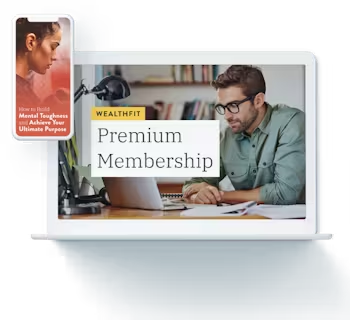Networking 101.
Did you know that if you average the income of the 5 people you spend the most time with, your income would be very similar, if not the same?
It’s true!
This is why it’s so important to choose the people that you spend your time with.
How can you do that?
By professional networking the right way.
Professional networking the right way is the topic of the 6-part course “Networking Like A Pro”: Because Your Network Determines Your Net Worth taught by JP Servideo.
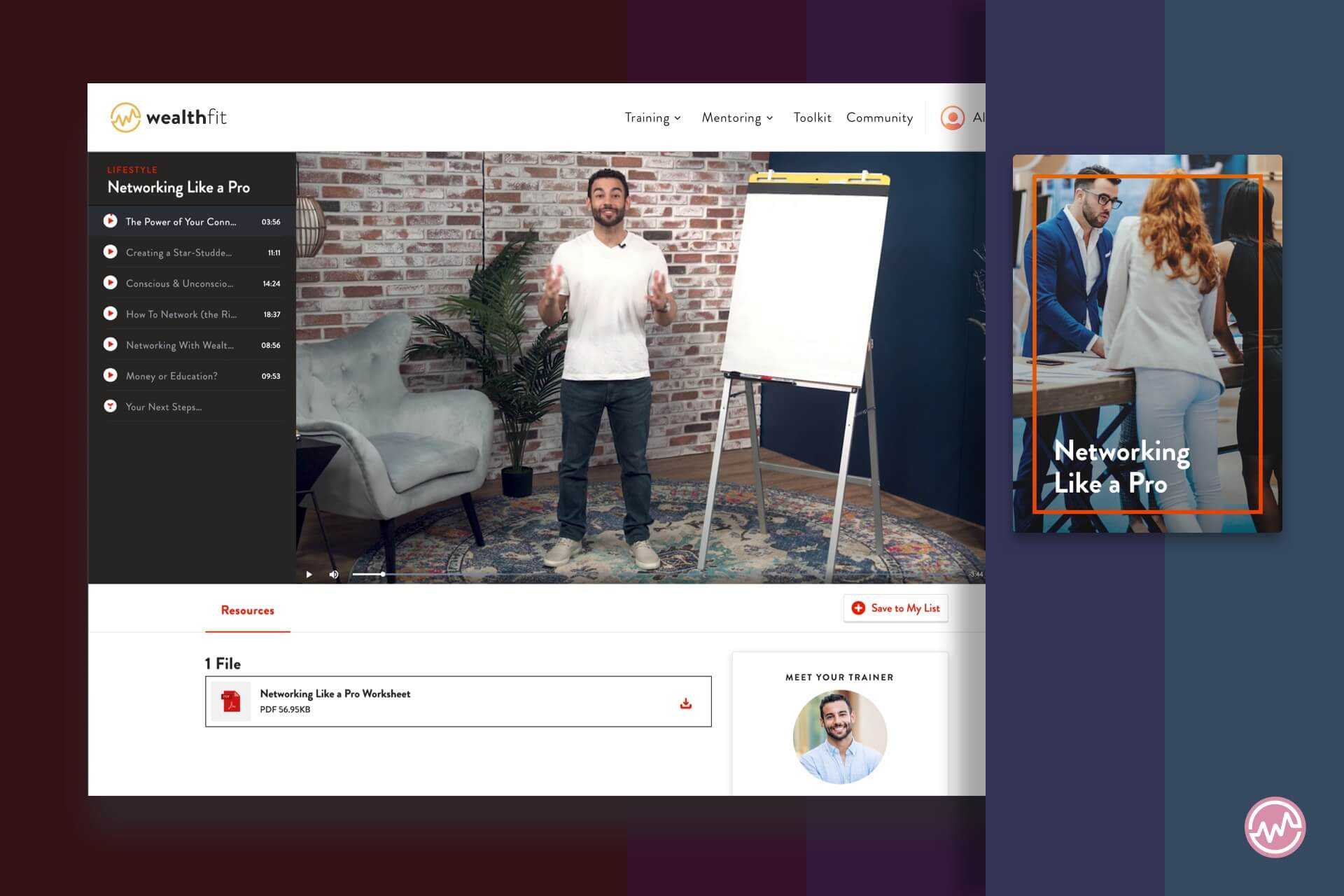
In this article, we’re going to explain a few of his powerful and actionable lessons on professional networking, including:
If you’re ready to learn how to begin professional networking, let’s begin!
Networking 101: What is Professional Networking?
Professional networking is the establishment of relationships with other professionals in, and associated with, your field of work.
Building these mutually beneficial relationships broadens your reach for business-sustaining resources.
Each person in your network should represent some facet of your business.
Professional Networking Example
For example, the real estate industry consists of:
Each of these professions overlaps in the real estate world making a network profitable for all.
So, how might a professional network in the real estate industry look?
Perhaps you’re an investor who flips houses. You’ll likely need a mortgage lender at some point for some creative financing for your portfolio. Or, maybe you have a buyer who is new to the area and doesn’t yet have a relationship with a local bank. Either way, you’ll need construction companies, and insurance companies.
Through professional networking, you can refer your buyer to the lenders in your network.
This reduces the chance of losing the buyer to another seller, and also helps your buyer find the local banking institution their family needs.
In addition to helping yourself sell the home, you added value to your relationship with the buyer, who needs a hometown bank, and the lender, who is in daily contact with consumers and is now likely to refer their clients to you.
These are win-win results that professional networking provides.
When the relationships are properly nourished, the benefits of professional networking may trickle down into your personal life as well.
For example, let’s say your child graduated from college with an engineering degree and is having a hard time finding a job. A church friend, who is in your network, may also be an engineer, and able to recommend your child to their firm.
Your network, or contact list, is likely the most valuable component of your business and costs nothing other than reciprocated referrals to have.
So, be diligent in creating your network with people you can assist and who can assist you.
Professional networking can benefit everyone.
Networking 101: When Should I Start Professional Networking?
It’s never too early or too late to begin professional networking.
Obviously, you will develop a contact list sooner — if you begin sooner.
If you are new to your career, you may not be sure of the various trades associated with your career.
In this case, you can begin by meeting others in the same field as you.
As you gain more experience and a better understanding of the various trades that overlap your own, you can begin to reach out to others at that time.
The Power Of Professional Networking
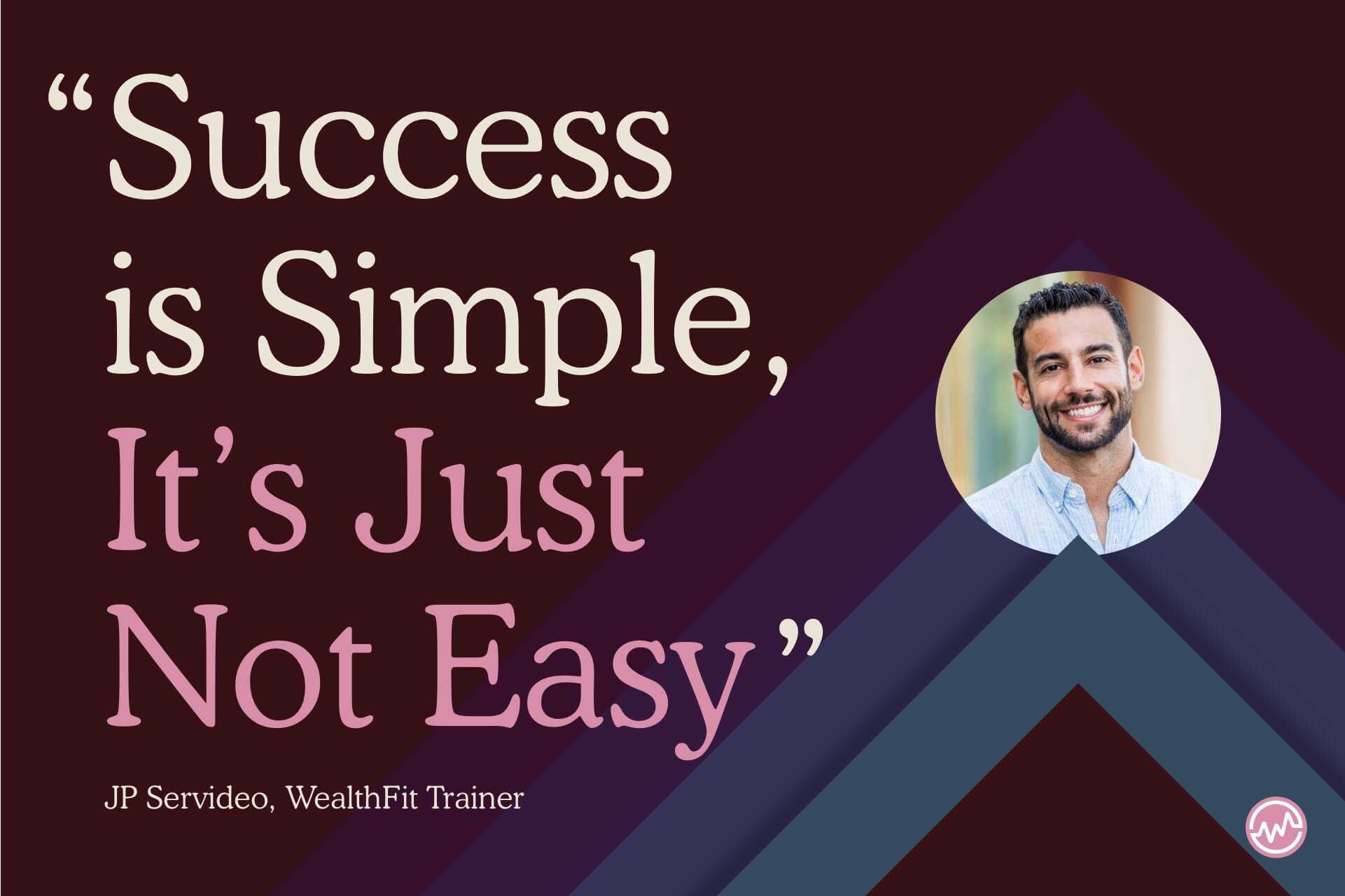
That’s why you need people on your team to help you.
If you’re choosing to spend your time with people who don’t have similar goals, eventually you will get tired from the resistance and you may end up doing what they do.
But there is another option: you can choose to move away from these people and find others who share your goals.
Look at it this way: if you’re around the right people, not only can they help you achieve your goals; if you are about to make a bad decision, they can either stop you or help you handle the situation in a different way.
In the course, JP explains that in your teens, emotion is more predominant than logic. Logic catches up to you in your mid-20s when your brain is fully developed.
The habits you create in your teens, driven by emotion, are like wet cement. That’s why it’s so critical to create healthy habits.
Next, we’ll explain just how powerful your habits are — some of it may shock you.
Networking 101: Do’s and Don’ts of Professional Networking
We will look at where to find people, how to develop an elevator pitch that people will remember, and other professional networking tips next.
Disclaimer
Before we begin, there is a disclaimer.
If you’re under 18, you shouldn’t be networking alone. Before networking, consult with your parents or guardian and help them vet connections for you.
Where to Find People
The first question you may have is “where can I find people to network with?”
Here are two ways.
Do What You’re Already Doing
The first way to find like-minded people and begin professional networking is to do the things you do already, such as sports, weekend events or volunteering.
You may not have realized, but there are likely people already around you who you can utilize. You just have to keep an eye out for them.
Find New Places
Ask yourself this: where do the people who I want to hang out with spend their time? Where do they go the most?
If you’re an athlete, go to a summer camp.
If you’re an entrepreneur, join the local entrepreneur club or enter an entrepreneurial contest.
If you’re a musician, spend time at a music store or consider joining a band.
If you’re a writer or reader, join a book club.
Take the next step in your professional networking path by stepping out and finding new places.
Develop Your Elevator Pitch
Once you know where you want to go to find people to professional network with, develop an elevator pitch.
An elevator pitch is a brief explanation about what you do and why you do it.
If you had 30 seconds with someone who you think could help you, what would you say? Keep in mind that you might never have that opportunity again.
Once you have 2 or 3 sentences, practice it so that it becomes easy and stress-free to say out loud.
Next, we’ll look at specific networking tips that you can utilize moving forward.
Don’t Remain Silent
When attending industry events, or even social ones, talk to people.
You want to build a professional network that will boost your career and make your life easier.
You can’t do this by being quiet when around others.
Remember, most people at these events are also building a network.
If you are not engaging, they will not be able to see the value of including you in their network.
Don’t Forget to Make Notes
You should have a pen and pad with you every time you meet someone. That’s networking 101.
Make notes of:
If you agreed to call them on a certain day, make a note of that.
Also, make a note of any personal information they shared, such as:
When you call them later, the notes will help you remember to ask about the new grandbaby or newlyweds.
Genuinely asking about these personal things will mean a lot to them and help further the relationship, and help your professional networking.
Don’t Waste Time Their Time — Or Yours
Professional networking should add value to you and those within the network.
If it or someone within the network doesn’t, then you are wasting time on the wrong people.
Remember, the goal of professional networking is not building a buddy list, but building a list of like-minded individuals with whom you can grow professionally.
Networking 101: 4 Simple Professional Networking Tips
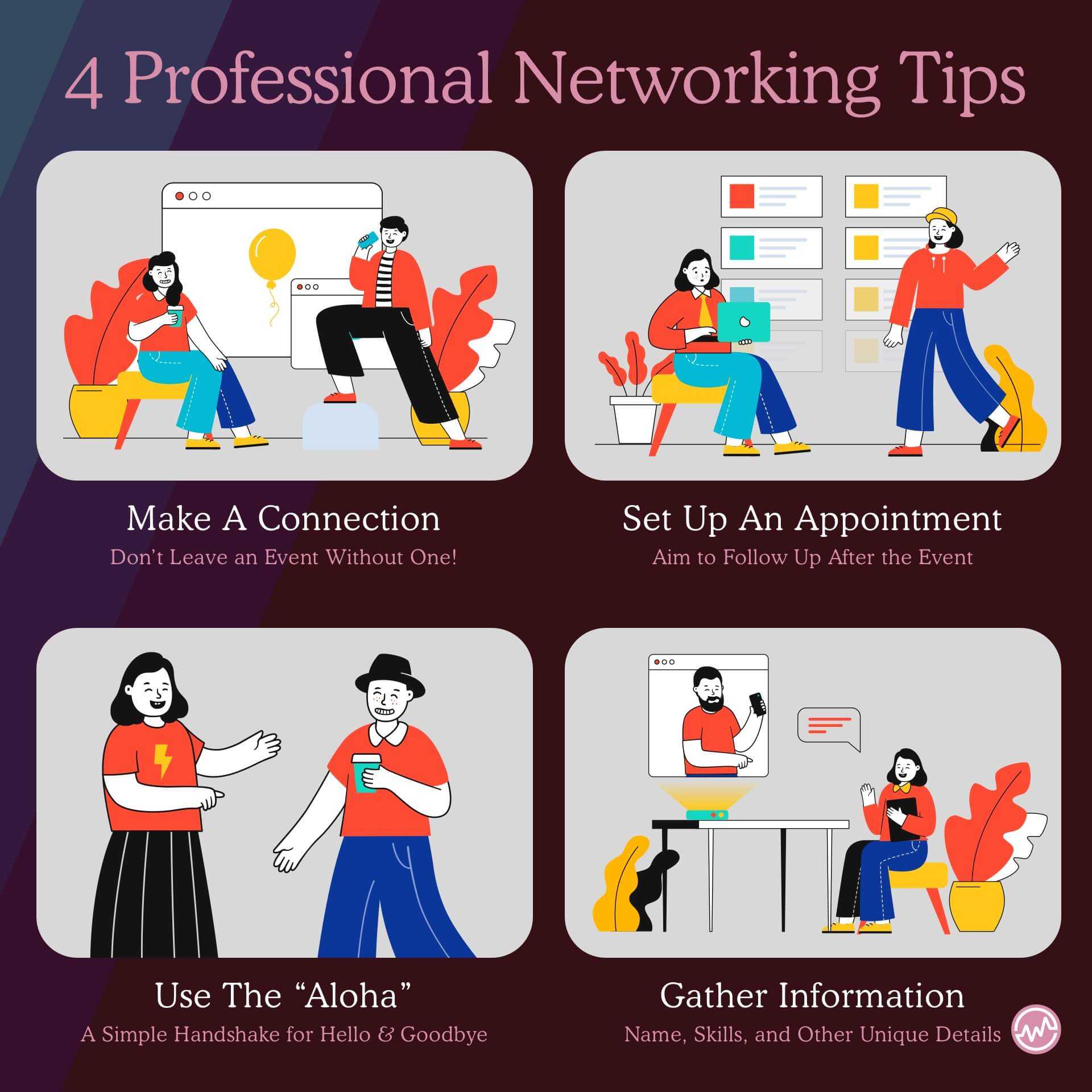
Leave An Event With 1 Brand New Connection
JP explains that while he likes to meet many new people, he has a goal of building stronger relationships with a handful of people he’s specifically interested in.
He sets the goal of walking out of an event with 1 brand new connection.
Set Up 1 Appointment
At a networking event, many people pass out business cards. JP hands his business card out as well, but he also tries to set up 1 appointment to follow up with someone after the event.
The “Aloha”
Meeting new people can be overwhelming, and some may love to talk. If one person consumes too much of JP’s time, he’s not available to meet others as well.
If he’s in a conversation with someone and wants to leave the conversation, he uses what he calls the “Aloha”. Aloha means hello and goodbye in Hawaiian culture, and JP will stick out his hand even if the person is mid sentence.
He explains that if you can do this the right way, the other person will shake your hand and they will end the conversation, thus freeing you up to meet other people.
Information Gathering
At any professional networking event, you meet many people and likely leave with many business cards. That’s why it’s important to keep track of the people you meet.
Whether it’s in a notebook or in a spreadsheet on your computer, log the following:
JP also recommends following up with an email for people you’re interested in connecting with down the road.
Professional Networking With Wealthy People
You can network with wealthy people — if you know how.
Whatever your goals are — whether it’s launching a business, starting your own cause with a social entrepreneurship idea or start your own Amazon business — you can find someone who’s already done what you want to do and you can learn from that person.
For example, if you’re a football player and want to be a linebacker, you don’t learn from a quarterback — you learn from the best linebacker you can find.
Law of Reciprocity
Wealthy people are constantly asked for things, whether its their
You could do the same, but you are more than likely to get rejected. Instead, JP walks up to a wealthy person and asks “how can I help you?”
JP keys in on adding value and helping people get what they want. The law of reciprosity explains that if you help someone, they’ll feel a natural inclination to help you.
Follow Their Content
JP also explains that in today’s digital age, you have an advantage previous generations haven’t. You have access to content that wealthy people create, such as:
Professional Networking: Networking 101 Tools
Here are a few tools and apps you can utilize to enhance your professional networking.
LinkedIn launched twenty years ago and is the world’s largest online professional networking site.
In addition to being a platform for millions of users to share their experiences, LinkedIn has also helped professionals find employment opportunities.
Meetup
Meetup is another professional networking platform that has been around for a long time.
It was founded twenty years ago and connects people with common interests.
Meetup allows users to create groups and share their professional experiences. Meetup is different than most platforms in that it facilitates offline groups.
Members of Meetup groups can simultaneously connect to other similar groups as well.
Udyomitra
Udyomitra was launched in 2016 and quickly became a rival to LinkedIn and Meetup.
This platform serves as a social media platform for professionals and is instrumental in helping users create and share their resumes.
Opportunity
Opportunity is another professional networking platform that connects professionals daily.
Opportunity is a diverse tool in that helps those in sales to find leads and job seekers to find employment.
The platform allows users to apply for jobs in real-time and matches people together by their business.
Facebook Groups
Joining an existing Facebook group of like-minded individuals in your field is one of the best ways to jump-start your professional networking plan.
For best results, create your own group while also joining many others.
Networking 101
JP explains that if you take a plant that is lacking sunlight, in poor soil and is dying and replant it to an environment with everything it has lacked, it will flourish.
You can too. Meeting new people is scary, but it’s more scary to not achieve your goals or your purpose.
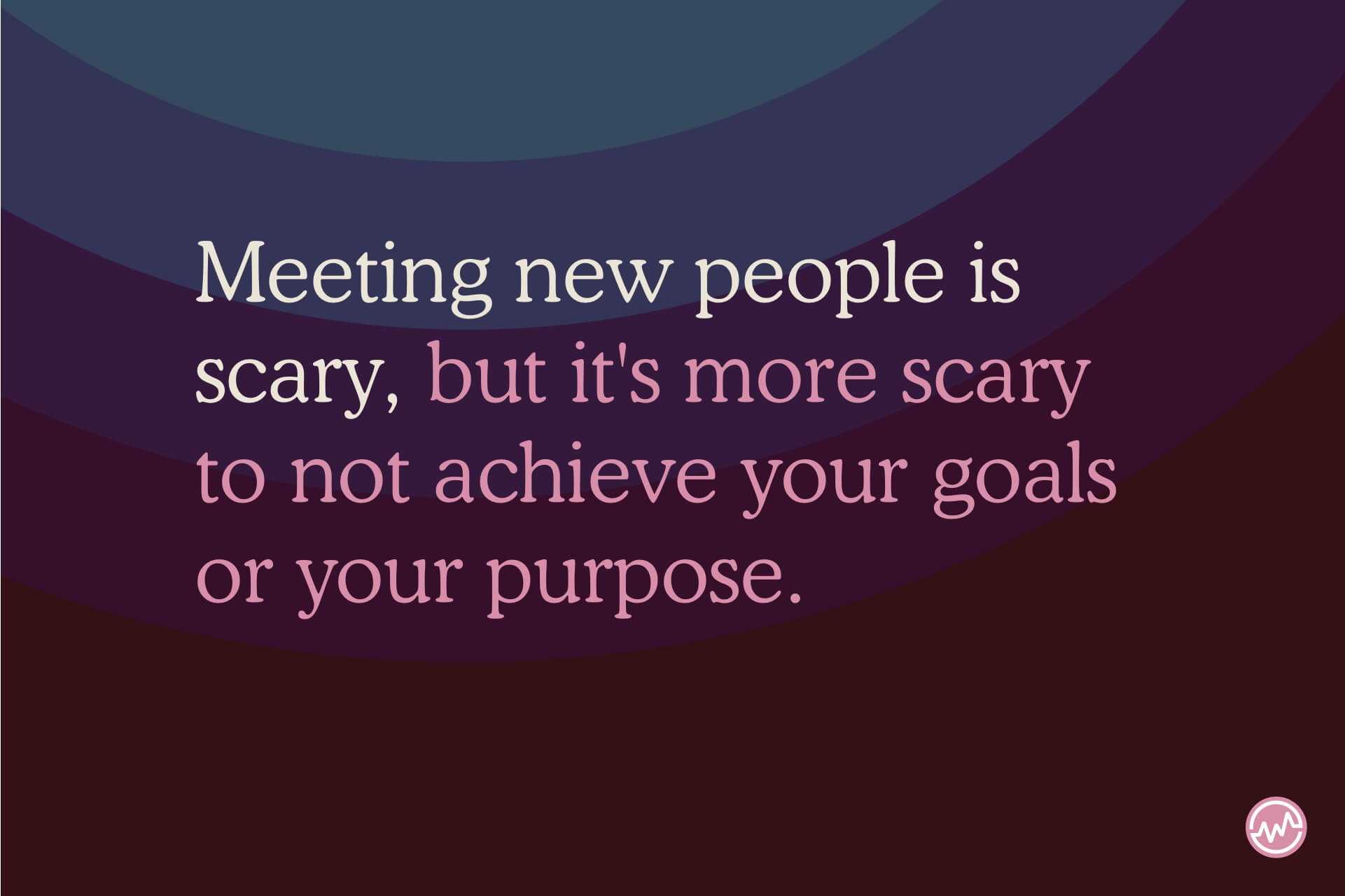
As you reflect on what you learned in this article, remember that your network determines your net worth.
Professional Networking: Networking 101
So if you’re ready to create a network of friends and mentors to guide you to greater levels of wealth, success, & happiness — take this course today and transform yourself into a world-class networker.
If you’d like to learn more about professional networking, watch “Networking Like A Pro”: Because Your Network Determines Your Net Worth today.

Professional Networking Additional (Free) Resources
Now that you know more about professional networking, here are a few additional (and free!) resources to enhance your productivity and leadership skills:


